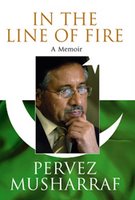 An eventful day. Went to Dhanmondi Rifles Square today to buy groceries from Agora. I then went to Samdani's uni to meet him. Caught a Black Cab back home. Bought Pakistani President Pervez Musharraf's autobiography 'In the line of Fire'. Quite an interesting read, not sure if all the content is 100% truth. But still good. Musharraf hasn't been totally honest about 1971 conflict between West Pakistan, East Pakistan and India in the book. He totally missed the massacre and genocide on 25 August 1971 in Dhaka. But at least he said the war was the result of Bhutto and Yahya Khan's arrogance and stupidity.
An eventful day. Went to Dhanmondi Rifles Square today to buy groceries from Agora. I then went to Samdani's uni to meet him. Caught a Black Cab back home. Bought Pakistani President Pervez Musharraf's autobiography 'In the line of Fire'. Quite an interesting read, not sure if all the content is 100% truth. But still good. Musharraf hasn't been totally honest about 1971 conflict between West Pakistan, East Pakistan and India in the book. He totally missed the massacre and genocide on 25 August 1971 in Dhaka. But at least he said the war was the result of Bhutto and Yahya Khan's arrogance and stupidity.Although it seemed to me that, the book contained fabricated facts, it was an interesting read indeed. I did like some of his ideas. The poor soul tried to be friends with BJP government in India. How was this ever going to be possible? BJP is lead by the most amounts of dunderheads in India. I quite like the present government in India. Dr. Manmohon Singh looks like a decent guy. At least he is educated, thus doesn't have the ignorant stance that were common in BJP's government.
Pervez Musharraf blamed Dr. A. Q. Khan for selling the nuclear technology to North Korea, Iran, Libya, etc. He mentioned that these deals happened without anyone in the government's knowledge. I find this very hard to believe. I think Dr. A. Q. Khan was made scapegoat. How can a country not have control over it's nuclear research laboratory? How can someone produce nuclear weapons and transfer them abroad without government's knowledge?
But I guess he had to say these things to save his and his predecessors back, moreover he had to save Pakistan from another diplomatic sanction. So I think I can forgive him for those comments.
What he has done really well in his tenure as the head of Pakistan was, he turned the country's economy up side down. As he said himself that he is not good in economy, despite that he managed to turn the economy of Pakistan in the right direction just by putting the right people in the right places and by strict check and balance. Which is now badly needed in Bangladesh.
Had a little fight in the afternoon at the gas station!! Got few bruises, left some bruises on some people too. A bad day overall..
Comments